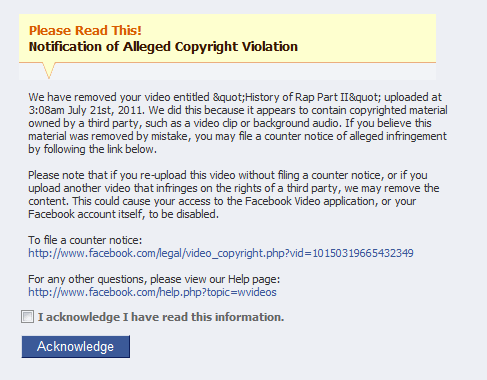With viral videos racking in around four billion views per day on Facebook, several copyright infringement issues are becoming more apparent, and they are stemming from these popular videos. According to a recent article in the Business Insider, “There is more money than ever before in online video. YouTube stars like Zoella, [also known as Vogue’s Queen of the Haul,] are landing book deals and making enough to buy mansions.” The article goes on to describe celebrities’ recent fanbase and profit growth that can both be attributed to the celebrities’ display of other people’s content on their pages. Although YouTube has always been known for offering a share of its advertising revenues with its users, Facebook is experimenting with something similar.
What is a Viral Video?
For the purposes of this article, a viral video is one that quickly circulates to a very large audience on the Internet. A video may become viral by posting or sharing the video or clips from the video on the Internet.
Copyright and How it Applies to Viral Videos
As mentioned in Copyright Infringement, “Copyright protection subsists, in accordance with this title, in original works of authorship fixed in any tangible medium of expression, now known or later developed, from which they can be perceived, reproduced, or otherwise communicated, either directly or with the aid of a machine or device.” 17 U.S.C. §102(a). For a work to be considered original, it must be independently created by the author and it must posses some minimal degree of creativity.
First, to obtain copyright protection, a video must have an author. This means that a person set up or controlled the camera or the object used to record the video. Next, the content must posses some minimal degree of creativity. The level of minimal degree of creativity could be established through an author’s creative choice of lighting, angles, movement, and timing used in the video.
Copyright Registration
Once copyright protection has been established, the copyright may be registered, but when dealing with viral videos, registration of the copyright is essential to bring action against infringers. Congress established a voluntary system of registration; however, it created incentives for copyright owners to register their copyrights. Under the Copyright Act of 1976 (hereinafter Copyright Act), registering a copyright gives the copyright owner the right to enforce its copyright in federal court. 17 U.S.C. §411(a). To establish copyright infringement, two elements must be proven:
(1) Ownership of a valid copyright, and
(2) Copying of constituent elements of the work that are original.
Enforcing a copyright through an infringement lawsuit is an important mechanism for a copyright owner because it comes with incentives and remedies. Although copyright owners may want to avoid a lawsuit due to the expensive process of litigation, the Copyright Act states, “the court in its discretion may allow the recovery of full costs by or against any party other than the United States or an officer thereof. Except as otherwise provided by this title, the court may also award a reasonable attorney’s fee to the prevailing party as part of the costs.” 17 U.S.C. §505.
Remedies
One remedy available to a registered copyright owner is the collection of damages. As mentioned in Statutory Damages Under Copyright and Actual Damages Under Copyright, “[A]n infringer of copyright is liable for either:
(1) the copyright owner’s actual damages and any additional profits of the infringer; or
(2) statutory damages.”
When actual damages, damages suffered by someone that can be precisely measured as a result of another’s wrongdoing, are difficult to obtain or if a work has little extrinsic value, statutory damages are available to copyright owners. Statutory damages can range between $750 and $30,000 for each infringing work. Additionally, if the court finds that the infringement was willful, it may award statutory damages up to $150,000 for each infringed work. 17 U.S.C. 504(c)(2).
Another available remedy for a registered copyright owner includes an injunction. An injunction is an order from the court that compels a party to do or refrain from specific acts, such as copying.
For more information about copyright infringement of viral videos, contact Revision Legal’s copyright attorneys through the form on this page or call (855) 473-8474.




